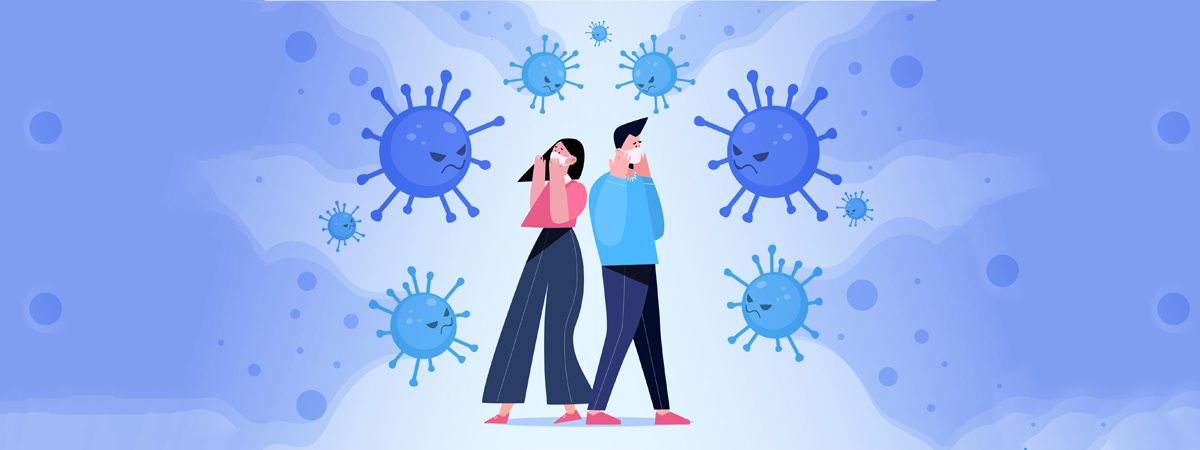How To Prevent Influenza During Monsoon When You Have Diabetes

How To Prevent Influenza During Monsoon When You Have Diabetes
Influenza & diabetes can be a deadly combination. People with diabetes risk developing severe flu complications, which can result in hospitalization and sometimes even death.
The flu can also worsen chronic health problems like diabetes because it weakens the immune system. Furthermore, the flu can make it harder to control your blood sugar levels. People with diabetes need to follow proper treatment if they become ill.
Read the article to learn more about preventing influenza during Monsoon When You Have Diabetes.
Influenza is a viral infection; it attacks the respiratory system — nose, throat and lungs. Influenza is commonly called “flu”, & it’s not the same as stomach “flu” viruses that cause diarrhoea and vomiting.
For most people, the flu resolves on its own. But sometimes, influenza and its complications can be deadly. People at higher risk of developing flu complications include:
- People older than 65
- People with weak immune systems
- People with chronic illnesses, such as asthma, heart disease, kidney disease, liver disease & diabetes.
- People who are obese (BMI> 40)
Common signs & symptoms of the flu include:
- Loss of consciousness & high fever lasting for more than a week
- Dry mouth, loss of appetite
- Aching muscles
- Chills and sweats
- Dry, persistent cough
- Shortness of breath
- Tiredness and weakness
- Runny or stuffy nose
- Blood sugar levels higher than 240 (or constantly rising levels)
How does the flu affect blood sugars?
When the body fights, it manufactures additional glucose to provide energy for fighting the infection.
The flu might even cause the body to release the stress hormones adrenaline or cortisol, which reduce the efficacy of insulin which results in high glucose levels that are difficult to control.
With low insulin levels, the body can’t use the glucose circulating through it effectively. It turns to ketones for energy. So ketones and high glucose levels make the body too acidic to function properly.
This is often referred to as diabetic ketoacidosis, an emergency requiring immediate medical attention.
The flu may also trigger hyperosmolar hyperglycemic nonketotic syndrome (HHNS), in which your glucose levels are so high that the body essentially becomes dehydrated trying to compensate. This, too, is a life-threatening emergency.
These conditions can be avoided by following a diabetes management plan.
Flu usually spikes blood glucose levels, although people on hypo-causing medication may be at risk of too low sugar levels if insufficient if there is insufficient carbohydrates in the diet.
What to do if a person with diabetes gets the flu?
The flu is an extremely contagious disease, and it’s possible one could become sick even after taking all the required precautions.
People with diabetes should seek medical care early. The sooner the antiviral medications are taken the better; it’s best if taken in the first 48 hours of having the flu, as they can make you feel better sooner.
Additionally, they can reduce the chances of further flu-related complications, which is especially important for people with diabetes.
Since diabetes is a chronic condition, one needs to be very thorough with the self-care practices and take additional steps to keep both flu symptoms as well as blood sugar levels on leash.
One of the things that’s very important when you fall sick with the flu if you have diabetes, is to
- If you get the flu, it is important to monitor your blood glucose levels more than usual because the feelings of illness can mask high or low blood sugar symptoms. One could develop hypoglycemia or hyperglycemia without realizing it.
- The glucose testing frequency depends on your particular circumstances and medication. If you are on hypo-causing medication, you should test every few hours to monitor if your sugar levels are too high or low.
- If not on hypo-causing medication, blood glucose testing may still be useful for ensuring that the sugar levels do not shoot too high.
- If you take insulin, it is recommended to check for ketones if blood glucose levels rise above 15 mmol/L. If ketones are too high, it is possible to fall into a diabetic coma, which can be fatal if untreated.
- Stick to your routine eating habits, even when you do not feel hungry.
- Drinking plenty of fluids
- Skipping or doubling down on medication doses is not at all advisable under any circumstances.
It should also be remembered that with diabetes; the body has a harder time fighting off viruses and infections, and the symptoms might take more time to go away. The illness might be long and can make your body extremely weak and drain you out.
What should a person with diabetes eat when they have the flu?
Many people with diabetes lose their appetite when they have the flu. However, it is vital to continue practicing a regular healthy diet and drinking fluids to help manage your blood sugars and diabetes.
If you cannot eat, it is advisable to consume drinks with carbohydrates to fuel the body with energy. Monitor blood glucose levels closely, and consult your doctor if you need advice in managing your blood glucose levels.
Influenza & diabetes can be a deadly combination. So in case, you experience symptoms, please reach out to your doctor as soon as possible.
This blog provides general information for educational and informational purposes only and shouldn't be seen as professional advice.












